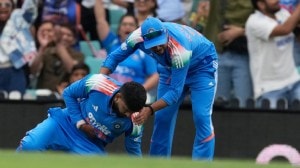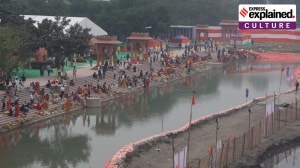We became sitting ducks because we listened to Bodo leaders
Kokrajhar: Well-planned strategy behind attacks,say survivors
In the past two days,as many as 21 relief camps have opened in this small town in Kokrajhar bordering Dhubri district the two worst-affected districts in the recent violence. With more and more people trooping in every hour,about 50,000 are estimated to be taking shelter in these camps local volunteers peg the figure at over 1 lakh. They are all victims of the ethnic clashes that remained hidden from public gaze for some time,confined to the interiors of Kokrajhar and Dhubri.
With security forces carrying out flag marches in different parts of the districts in the last few days,the victims gathered the courage to leave their hideouts in the forests,relatives houses and highways,collected whatever belongings they could find,and moved to the safety of relief camps. They used any mode of transport available horse carriages,bullock carts,trucks,bicycles,auto-rickshaws.
Eyewitness accounts at the Hatidhura camp indicated a well-planned strategy behind the attacks. They said that during the initial days of the flare-up,the Bodos living in areas with mixed population went to the Muslims and advised them to shift to some other areas,in big groups.
We became sitting ducks because we listened to the Bodo leaders and shifted to an area near our village to stay together. This enabled the attackers to set fire to our unguarded houses. At the same time,they encircled the area where we had all shifted, said Azizul Haque,one of the many refugees at a relief camp.
They came in large numbers wearing outfits similar to the uniforms of the security forces some in green combat dress,others in black uniforms like commando units, recalled Haque,who was shot in the stomach. I survived,but many others were killed, he added.
Md Ataur Rahaman of Harafuta village in Kokrajhar confirmed that the attackers were wearing black uniforms,adding that they must have been well-trained Bodo cadres.
Sarifullah,of Joyma village in Kokrajhar,recounted how his brother Mohibul,a Class X student,was pulled down from a vehicle near a hotel in Gosaingaon hotel and stabbed in the stomach yesterday morning,while they were fleeing their home.
The two brothers were part of a group travelling in an overloaded vehicle. Mohibul,who had just managed to grab a toe-hold,was pulled out by the attackers and stabbed repeatedly. He was rushed to Dhubri hospital,where he was declared dead. Sarifullah is among the over 10,000 people who have taken shelter at the Hatidhura relief camp.
There were retaliations also. A youth was hounded out of the North East Express near Gosaingaon by an armed mob. He pleaded that he was a Nepali,but the attackers did a body search and found a card identifying him as Narzary,which is a Bodo name. He was killed on Monday.
Khampa Borgoyri,deputy chief executive of the Bodoland Territorial Autonomous Council,said many Bodos in isolated villages in Chirang and Dhubri have been killed. As soon as the clashes broke out after the killing of four Bodo youths in Kokrajhar earlier this month,many Bodos shifted to safer places in Kokrajhar. But about 60 villages in Dhubri where the Bodos remained behind were attacked,their houses burnt down and the people killed,according to Borgoyri.
The relationship between the two communities started deteriorating after the All Bodoland Minority Students Union and the All Assam Minority Students Union began raising their voices against the Bodos,reverting to their separate statehood demand in recent times. The minorities bodies also held an Assam bandh recently,triggering more animosity.
Meanwhile,the survivors alleged that the government has not made any arrangements for food or water so far. A steady stream of VIPs,from ministers to MLAs,are visiting Hatidhura. But they only hold closed-door meetings. Nobody has visited the relief camps so far, said Nurul Haque and Ibrahim Hussein Sheikh,who have been managing several relief camps. Whatever food is provided is because of our individual efforts, they added.



- 01
- 02
- 03
- 04
- 05




























